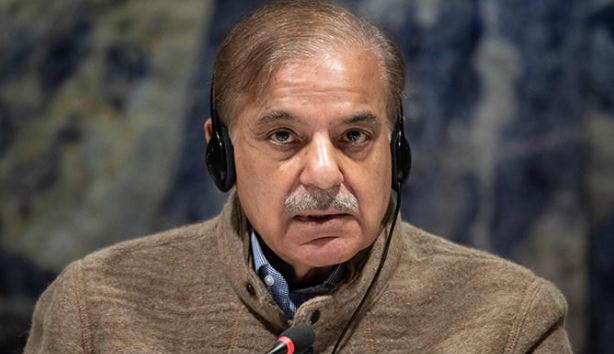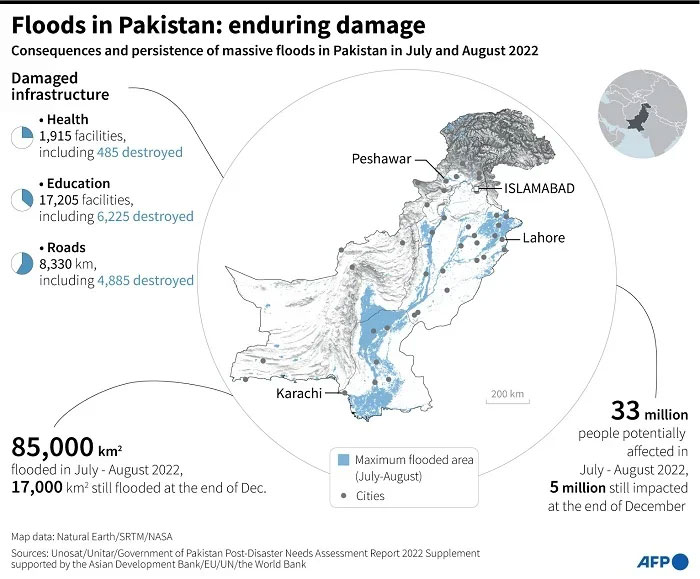Pakistan secures $570m more than targetted $8bn flood aid at Geneva donors’ conference
 GENEVA: Pakistan Monday secured pledges well over a targetted $8 billion in flood aid as it scrambles to mobilise funds to rehabilitate the devastated 33 million population and repair damages worth billions.
Information Minister Marriyum Aurangzeb, in a tweet, announced that Pakistan has already received total pledges of $8.57 billion at the International Conference on Climate Resilient Pakistan in Geneva.
The pledges came after Prime Minister Shehbaz Sharif launched an $8 billion flood aid appeal at the Geneva moot, aimed at helping the country overcome the devastation caused due to the cataclysmic floods.
Pakistan — with a $350 billion economy — faces financial distress after the deadly floods wreaked havoc on the country, which killed at least 1,700 and caused damages worth over $16 billion — half of which Islamabad is financing through its resources.
World Bank and Islamic Development Bank (IsDB) pledged over $6 billion to Pakistan to aid its climate rebuilding effort in response to the country’s $8 billion flood appeal.
The IsDB has pledged $4.2 billion over the next three years to Pakistan and World Bank $2 billion, while the United States, China and other nations have also announced support.
Pakistan is in dire want of $8 billion from world donors during the next three years to shore up the country’s economy which was mostly laid to waste by extreme floods from June to October 2022, PM Shehbaz told the moot’s participants.
“We are racing against time,” he said, stressing that relief work needed to continue as some areas of Sindh needed drainage of water, while the education of millions of children remains affected.
Officials from some 40 countries as well as private donors and international financial institutions have gathered in Geneva as Islamabad seeks support in what is expected to be a major test case for who pays for climate disasters.
‘New lifeline needed’
At the moot, the prime minister also launched the ‘Resilient Recovery, Rehabilitation, and Reconstruction Framework’ (4RF).
The framework not only outlines a vision for rehabilitation and reconstruction of the flood-affected areas but will also emphasise the need for global support and long-term partnership to implement it.
The premier called for a sustained international plan to meet the daunting task of reconstruction and rehabilitation of flood-affected areas and build a climate-resilient Pakistan.
He said a new lifeline was needed for Pakistani people to power their economy and re-enter the 21st century with a future that is protected from extreme risks to human security.
The prime minister said together “we have to rebuild the lives and dreams of flood-ravaged people”.
He said the international community’s solidarity and long-term support to Pakistan at this critical juncture would make the difference between staying unprepared or facing the future with renewed hope and aspirations.
“It is about the solidarity and vision needed to ensure the world’s transition to a sustainable future not on paper but on the ground in schools, in the fields, in business, in industries and in homes.”
The Pakistani premier said his coalition government had prepared a comprehensive framework for recovery, rehabilitation, and reconstruction with resilience.
“The first part of this plan reflects priorities for recovery and reconstruction, bearing in mind the minimum funding requirement of $16.3 billion, half of which is proposed to be met from domestic resources and the other half from development partners and friends,” Shehbaz said.
He added the funding gap for minimum recovery was $8 billion which would be needed over the next three years.
“The second part of the framework incorporates flood resilience design and infrastructure projects such as protecting key highways, rail-line networks, an early warning system and capacity building for rescue and relief in future disasters,” the PM said.
He said it was clear that Pakistan’s ability to recover from the colossal flood disaster, restore critical infrastructure and revive rapid economic growth would hinge substantially on the speed of these actions.
“The most important link in this chain will be financial resourcing and if that gap continues to obstruct our recovery and minimum resilience needs, the results will be too catastrophic to imagine,” he added.
GENEVA: Pakistan Monday secured pledges well over a targetted $8 billion in flood aid as it scrambles to mobilise funds to rehabilitate the devastated 33 million population and repair damages worth billions.
Information Minister Marriyum Aurangzeb, in a tweet, announced that Pakistan has already received total pledges of $8.57 billion at the International Conference on Climate Resilient Pakistan in Geneva.
The pledges came after Prime Minister Shehbaz Sharif launched an $8 billion flood aid appeal at the Geneva moot, aimed at helping the country overcome the devastation caused due to the cataclysmic floods.
Pakistan — with a $350 billion economy — faces financial distress after the deadly floods wreaked havoc on the country, which killed at least 1,700 and caused damages worth over $16 billion — half of which Islamabad is financing through its resources.
World Bank and Islamic Development Bank (IsDB) pledged over $6 billion to Pakistan to aid its climate rebuilding effort in response to the country’s $8 billion flood appeal.
The IsDB has pledged $4.2 billion over the next three years to Pakistan and World Bank $2 billion, while the United States, China and other nations have also announced support.
Pakistan is in dire want of $8 billion from world donors during the next three years to shore up the country’s economy which was mostly laid to waste by extreme floods from June to October 2022, PM Shehbaz told the moot’s participants.
“We are racing against time,” he said, stressing that relief work needed to continue as some areas of Sindh needed drainage of water, while the education of millions of children remains affected.
Officials from some 40 countries as well as private donors and international financial institutions have gathered in Geneva as Islamabad seeks support in what is expected to be a major test case for who pays for climate disasters.
‘New lifeline needed’
At the moot, the prime minister also launched the ‘Resilient Recovery, Rehabilitation, and Reconstruction Framework’ (4RF).
The framework not only outlines a vision for rehabilitation and reconstruction of the flood-affected areas but will also emphasise the need for global support and long-term partnership to implement it.
The premier called for a sustained international plan to meet the daunting task of reconstruction and rehabilitation of flood-affected areas and build a climate-resilient Pakistan.
He said a new lifeline was needed for Pakistani people to power their economy and re-enter the 21st century with a future that is protected from extreme risks to human security.
The prime minister said together “we have to rebuild the lives and dreams of flood-ravaged people”.
He said the international community’s solidarity and long-term support to Pakistan at this critical juncture would make the difference between staying unprepared or facing the future with renewed hope and aspirations.
“It is about the solidarity and vision needed to ensure the world’s transition to a sustainable future not on paper but on the ground in schools, in the fields, in business, in industries and in homes.”
The Pakistani premier said his coalition government had prepared a comprehensive framework for recovery, rehabilitation, and reconstruction with resilience.
“The first part of this plan reflects priorities for recovery and reconstruction, bearing in mind the minimum funding requirement of $16.3 billion, half of which is proposed to be met from domestic resources and the other half from development partners and friends,” Shehbaz said.
He added the funding gap for minimum recovery was $8 billion which would be needed over the next three years.
“The second part of the framework incorporates flood resilience design and infrastructure projects such as protecting key highways, rail-line networks, an early warning system and capacity building for rescue and relief in future disasters,” the PM said.
He said it was clear that Pakistan’s ability to recover from the colossal flood disaster, restore critical infrastructure and revive rapid economic growth would hinge substantially on the speed of these actions.
“The most important link in this chain will be financial resourcing and if that gap continues to obstruct our recovery and minimum resilience needs, the results will be too catastrophic to imagine,” he added.
‘Doubly victimised’
Addressing the event, United Nations Secretary-General Antonio Guterres also appealed to the world to help Pakistan deal with the disaster caused by cataclysmic floods, saying “massive investments” are needed for the country’s rehabilitation which is expected to cost more than $16 billion. “We must match the heroic response of the people of Pakistan with our own efforts and massive investments to strengthen their communities for the future,” Guterres said in opening remarks. “Pakistan is doubly victimised by climate chaos and a morally bankrupt global financial system,” he added, calling for creative ways for developing countries to access debt relief and financing. In a press conference alongside PM Shehbaz later, the UNSG called for sweeping reform of the international financial system to allow for low-income countries vulnerable to climate calamities to receive adequate funding from richer nations. Guterres said the international financial system was skewed to benefit wealthy countries and should be reformed to ensure a more equitable distribution of resources. “It is very clear that the present system is biased,” he told reporters in a strongly-worded critique of what he called a “morally corrupt global financial system”. “The system was conceived by a group of rich countries and naturally it basically benefits rich countries.”IsDB pledges $4.2bn over next three years
The IsDB has pledged $4.2 billion over the next three years to Pakistan in aid for its climate rebuilding effort, the bank’s president told the conference. “I am pleased to announce that the Islamic Development Bank group, as part of contributing to the achievement of Pakistan’s climate resilience and development objectives, pledges a financing amount of $4.2 billion over the next three years,” Muhammad Al Jasser, president of Islamic Development Bank said.ADB to prioritise up to $1bn over next three years
Asian Development Bank (ADB) vice president said the Manilla-based lender will prioritise up to $1 billion for Pakistan’s climate and disaster risk reconstruction and resilience support over the next three years. In a statement, the bank stated that ADB approved a $557 million emergency flood-assistance package to Pakistan on top of a $1.5 billion countercyclical programme. “ADB has acted swiftly to support Pakistan’s flood response,” it read, adding that the Manilla-based lender believes it is critical that reconstruction work shall be coupled with efforts on macroeconomic stabilization and good governance for recovery.US to give extra $100m
A senior official from the US development agency USAID said on Monday that Washington would provide an additional $100 million in funding for Pakistan’s recovery from devastating floods last year. “I am delighted to announce that the United States is making an additional 100-million-dollar commitment to Pakistan to help it recover from the devastating 2022 monster monsoon floods,” USAID Deputy Administrator Isobel Coleman told reporters on the sidelines of a major conference in Geneva.France announces $345m
French President Emmanuel Macron, in a video message, announced support for Pakistan — in talks with financial institutions — and said Paris would in the long term continue to provide expertise and financial support as required by Islamabad. The country has announced $345 million and will continue to provide expertise and some financial support to the country, Macron said. EU commits €500m to Pakistan European Commission President Ursula von der Leyen called the conference a timely initiative and said 2022 was a difficult year for the world owing to the pandemic as well as the worst flood hitting Pakistan, putting pressure on the vulnerable people. She said the scale of the flood-caused devastation was enormous as millions of people remained underwater for months and the children faced a shortage of food. Leyen said the conference was meant to adopt an ambitious plan to help Pakistan go back on the path to recovery. She also announced €500 million in aid for the country.Fiscal space, debt sustainability
In his remarks at a plenary, Federal Minister for Finance and Revenue Ishaq Dar said the support from friendly countries and multilateral donors would not only help carry out flood relief and rehabilitation work but also create fiscal space and external debt sustainability for the country and reinforce its efforts to implement the ongoing International Monetary Fund (IMF) programme. “Pakistan remains committed to its international obligations and is on track regarding its fiscal reforms agenda which focuses on increasing revenues, decreasing expenditures and creating thereby more fiscal space for the reconstruction and rehabilitation phase which we have to undertake in Pakistan,” the finance minister said. “Pakistan is carrying out the fiscal reforms necessary for long-term recovery and sustainability but we urgently need short-term assistance to navigate a number of challenges.” Dar hoped that Pakistan’s friends and partners would always stand with it by providing it with the required assistance during this most critical phase. “Options such as debt swaps by friendly countries would also free up resources to be spent for this noble purpose.”
Flood-hit Pakistan
Pakistan and the United Nations are holding the conference to mobilise international support to help the country recover more effectively from the devastation caused by recent floods. Additional funding is crucial to Pakistan amid growing concerns about its ability to pay for imports such as energy and food and to meet sovereign debt obligations abroad. However, it is far from clear where the reconstruction money will come from, especially given the difficulties raising funds for the emergency humanitarian phase of the response which is around half funded, according to UN data. At the COP27 meeting in Egypt in November, Pakistan was at the forefront of efforts that led to the establishment of a “loss and damage” fund to cover climate-related destruction for countries that have contributed less to global warming than wealthy ones. Pakistan’s ambassador to the UN in Geneva, Khalil Hashmi, said Islamabad was willing to pay for about half of the bill but hoped for support from donors for the rest. “We will be mobilising international support through various means,” he said. “We look forward to working with our partners.”« ECP rules LG polls in Karachi and Hyderabad will be held on Jan 15 (Previous News)
Related News

Brunei High Commissioner hosts 42nd National Day reception
A special highlight of the evening was High Commissioner Kamal Ahmed’s warm welcome to membersRead More

Russian embassy marks defender of fatherland day in Islamabad
ISLAMABAD, FEB 23 /DNA/ – The Embassy of the Russian Federation in Islamabad hosted aRead More


Comments are Closed